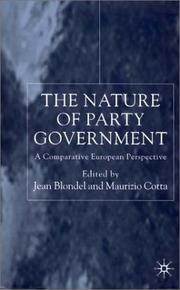| Listing 1 - 10 of 23 | << page >> |
Sort by
|
Book
ISBN: 9780415684774 9780203130698 0415684773 0203130693 9780415750073 1283458756 9786613458759 1136475087 9781136475030 9781136475078 9781136475085 0415750075 Year: 2012 Volume: 47 Publisher: London: Routledge,
Abstract | Keywords | Export | Availability | Bookmark
 Loading...
Loading...Choose an application
- Reference Manager
- EndNote
- RefWorks (Direct export to RefWorks)
This book provides a systematic and comparative account of the rise of 'new challenger parties' across Western Europe. It analyses how parties that challenge the conventional party system by addressing issues neglected by existing parties can succeed and fail.Systematically comparing 229 elections since 1950 across 15 European democracies, including the United Kingdom, France, Germany, Italy, the Benelux and Scandinavian countries, this book questions why new challenger parties are more successful in some countries than others, and analyses the conditions that determine their
Political parties --- Partis politiques --- Political parties - Europe, Western
Book
ISBN: 0333648196 9780333648193 Year: 1996 Publisher: London: MacMillan,
Abstract | Keywords | Export | Availability | Bookmark
 Loading...
Loading...Choose an application
- Reference Manager
- EndNote
- RefWorks (Direct export to RefWorks)
Political parties --- Populism --- Political parties - Sweden. --- Populism - Sweden. --- Political parties - Europe, Western. --- Populism - Europe, Western.
Book
ISBN: 9780415478809 0415478804 Year: 2011 Publisher: London: Routledge,
Abstract | Keywords | Export | Availability | Bookmark
 Loading...
Loading...Choose an application
- Reference Manager
- EndNote
- RefWorks (Direct export to RefWorks)
Is European party politics hovering above society? Why do voters pick one party over others? Is it a question of class? Of religion? Of attitudes about taxes or immigration or global warming? Or is it something else entirely? "The Structure of Political Competition in Western Europe" takes a detailed look at the ways in which Western Europe's party systems are anchored in social and ideological structures. The book's first section focuses on the role of social structures - particularly education, class and religion - and analyzes the complex interplay among these factors. The second section addresses the ways that the sociological structures such as class and religion interact with voters' values. The third section examines the way that these structures and values shape the space of political competition among parties. The conclusion integrates the findings of the empirical articles, putting them into broader comparative perspective, discussing whether relatively predictable structures have been overwhelmed by media-driven spectacles, political personalities and focus on short-term economic performance. This volume will appeal to scholars and graduate students in Europe and those from North America, Asia and other regions who study European politics, political parties, cleavages and political behaviour. This book was published as a special issue of "West European Politics".
Political parties --- Political sociology --- Western Europe --- Competition --- Social aspects --- Sociological aspects --- Political parties - Europe, Western --- Political parties - Social aspects - Europe, Western --- Political parties - Europe, Western - Sociological aspects --- Competition - Europe, Western
Book
ISBN: 9780230337091 0230337090 9781349340675 1349340677 9786613722065 1137017856 1280880759 Year: 2012 Publisher: New York (N.Y.): Palgrave MacMillan,
Abstract | Keywords | Export | Availability | Bookmark
 Loading...
Loading...Choose an application
- Reference Manager
- EndNote
- RefWorks (Direct export to RefWorks)
Multi-Level Party Politics in Western Europe is a study of territorial dynamics within party systems and party organizations in Western European multi-layered systems. It argues that processes of state restructuring and party crisis have forced parties to adapt their competitive strategies and internal structures. With the logic of territorial party competition becoming more complex, parties in Europe have developed quite different responses to deal with the challenges of multi-level politics. This book challenges the 'national bias' of party research which has traditionally focused on the statewide level by assuming broadly uniform patterns. Speaking to students of party politics and territorial studies, it contributes to a new territorial approach which acknowledges the importance of multi-layered institutional framing for party politics. Its also includes a thorough comparative analysis of vertical linkages and sub-state autonomy in Austrian, Belgian, British, German and Spanish parties.
Book
ISBN: 9781138367449 9781138367456 9780429771033 0429771037 0429771029 9780429429798 0429429797 9780429771026 9780429771019 0429771010 1138367451 1138367443 Year: 2021 Publisher: Abingdon (Oxon): Routledge,
Abstract | Keywords | Export | Availability | Bookmark
 Loading...
Loading...Choose an application
- Reference Manager
- EndNote
- RefWorks (Direct export to RefWorks)
"This book analyses how party competition has adjusted to the success of populism in Western Europe, whether this is non-populists dealing with their populist competitors, or populists interacting with each other. The volume focuses on Western Europe in the period 2007-2018 and considers both right-wing and left-wing populist parties. It critically assesses the concept and rise of populism, and includes case studies on Austria, France, Germany, the Netherlands, Switzerland, Denmark, Finland, the United Kingdom, Greece, and Italy. The authors apply an original typology of party strategic responses to political competitors, which allows them to map interactions between populist and non-populist parties in different countries. They also assess the links between ideology and policy, the goals of different populist parties, and how achieving power affects these parties. The volume provides important lessons for the study of political competition, particularly in the aftermath of a crisis and, as such, its framework can inform future research in the post-Covid-19 era. This wide-ranging study will appeal to students and scholars of political science interested in populism and political competition; and will appeal to policy makers and politicians from across the political spectrum"--
Populism --- Political parties --- Europe, Western --- Politics and government --- Political science --- West Europe --- Western Europe --- Populism - Europe, Western --- Political parties - Europe, Western --- Populism - Europe, Western - Case studies --- Political parties - Europe, Western - Case studies --- Europe, Western - Politics and government - 21st century --- Europe, Western - Politics and government - 21st century - Case studies --- Populisme --- Partis politiques --- Politique et gouvernement --- Case studies. --- Western Europe.

ISBN: 0333681991 0312237626 9780312237622 9780333681992 Year: 2000 Publisher: Basingstoke Palgrave
Abstract | Keywords | Export | Availability | Bookmark
 Loading...
Loading...Choose an application
- Reference Manager
- EndNote
- RefWorks (Direct export to RefWorks)

ISBN: 033361660X 031215917X 9780333616604 Year: 1996 Publisher: Houndmills, Basingstoke, Hampshire : New York : Macmillan Press ; St. Martin's Press,
Abstract | Keywords | Export | Availability | Bookmark
 Loading...
Loading...Choose an application
- Reference Manager
- EndNote
- RefWorks (Direct export to RefWorks)
Political parties --- -#SBIB:324H43 --- Partis politiques --- Europe [Western ] --- United States --- India --- #SBIB:324H43 --- #A9610A --- Politieke structuren: politieke partijen --- Political parties - Europe, Western --- Political parties - United States --- Political parties - India
Book
ISSN: 00089664 ISBN: 9782870752173 2870752172 Year: 2019 Volume: 2420-2421 Publisher: Bruxelles: CRISP,
Abstract | Keywords | Export | Availability | Bookmark
 Loading...
Loading...Choose an application
- Reference Manager
- EndNote
- RefWorks (Direct export to RefWorks)
Depuis le début du 21e siècle, l’extrême droite gagne du terrain sur le Vieux Continent. Au fil des scrutins, elle progresse dans les urnes et gagne en légitimité auprès d’une frange croissante de la population européenne. Certes, le mouvement n’est pas uniforme. Mais il n’empêche que, globalement, l’extrême droite est aujourd’hui bien davantage présente dans les assemblées parlementaires européennes qu’elle ne l’était il y a quinze ou vingt ans. Bien plus, au cours des deux dernières décennies, plusieurs formations politiques d’extrême droite ont pris part à l’exercice du pouvoir : soit indirectement en soutenant un gouvernement minoritaire, soit directement en intégrant une coalition gouvernementale. L’influence de l’extrême droite sur les processus publics de décision s’en trouve ainsi sensiblement accrue. Ce Courrier hebdomadaire est consacré aux évolutions récentes des partis d’extrême droite dans 18 pays d’Europe de l’Ouest : Allemagne, Autriche, Belgique, Danemark, Espagne, Finlande, France, Irlande, Islande, Italie, Luxembourg, Malte, Norvège, Pays-Bas, Portugal, Royaume-Uni, Suède et Suisse. Il relève les événements clés qui ont marqué le développement de chacun de ces partis, les stratégies politiques qu’ils développent, et leurs rapports avec les pouvoirs législatif et exécutif. Une attention particulière est réservée au cas de la Belgique, de part et d’autre de la frontière linguistique.
Book
ISBN: 9780415581950 9780203848654 0415581958 0203848659 1136949879 1282898647 9786612898648 9781136949821 9781136949869 9781136949876 9781138882164 Year: 2011 Volume: 36 Publisher: London: Routledge,
Abstract | Keywords | Export | Availability | Bookmark
 Loading...
Loading...Choose an application
- Reference Manager
- EndNote
- RefWorks (Direct export to RefWorks)
Social pacts - policy agreements between governments, labor unions and sometimes employer organizations - began to emerge in many countries in the 1980s. The most common explanations for social pacts tend to focus on economic factors, influenced by industrial relations institutions such as highly coordinated collective bargaining. This book presents, and tests, an alternative and complementary explanation highlighting the electoral calculations made by political parties in choosing pacts. Using a dataset covering 16 European countries for the years 1980-2006, as well as eight
Social law. Labour law --- Political sociology --- Western Europe --- Consensus (Social sciences) --- Political parties --- Elections --- Europe, Western --- Politics and government --- Consensus (Social sciences) - Europe, Western --- Political parties - Europe, Western --- Elections - Europe, Western --- Europe, Western - Politics and government - 1989 --- -Consensus (Social sciences) - Europe, Western --- -Consensus (Social sciences)

ISBN: 0415164370 9780415164375 Year: 1998 Volume: 1 Publisher: London: Routledge,
Abstract | Keywords | Export | Availability | Bookmark
 Loading...
Loading...Choose an application
- Reference Manager
- EndNote
- RefWorks (Direct export to RefWorks)
Ethnoregionalist parties are an increasingly influential political phenomenon in many Western European countries. This volume explores the successes and failures experienced by these parties in post-war Europe.
Political parties --- -Regionalism --- -#SBIB:054.AANKOOP --- #SBIB:324H43 --- #A9804A --- Parties, Political --- Party systems, Political --- Political party systems --- Politieke structuren: politieke partijen --- #A9902PO --- Regionalism --- Partis politiques --- Régionalisme --- National movements --- Europe --- #SBIB:054.AANKOOP --- Human geography --- Nationalism --- Interregionalism --- Political parties - Europe, Western --- Regionalism - Europe, Western
| Listing 1 - 10 of 23 | << page >> |
Sort by
|

 Search
Search Feedback
Feedback About UniCat
About UniCat  Help
Help News
News